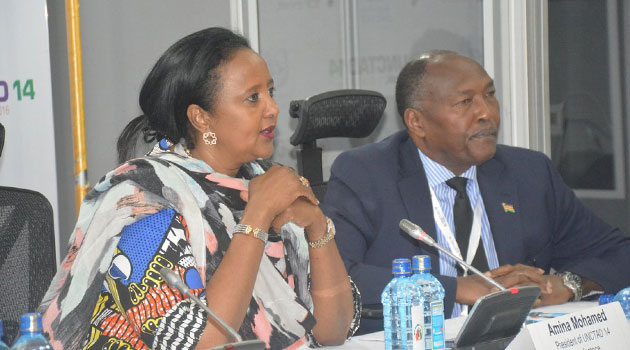
UNCTAD 14 President Amina Mohamed says the issue has taken centre stage in the talks as the non-tariff barriers continue to hinder fair global trade/CFM NEWS
According to data released during the 14th United Nations Conference of Trade and Development, the losses are equal to 10 percent of developing countries’ total exports.
UNCTAD 14 President Amina Mohamed says the issue has taken centre stage in the talks as the non-tariff barriers continue to hinder fair global trade.
“The common understanding from the discussions is that tariff liberalisation alone has generally proven unsuccessful in providing genuine market access drawing further attention to non-tariff measures as major determinants in restricting market access,” Mohamed said during Wednesday’s media briefing at the Kenyatta International Convention Centre, Nairobi.
The members of the G20 include Argentina, Australia, Brazil, Canada, China, France, Germany, India, Indonesia, Italy, Japan, Republic of Korea, Mexico, Russia, Saudi Arabia, South Africa, Turkey, United Kingdom, United States, and the European Union.
In efforts to try and resolve the issue, UNCTAD has now created a new database that will list the non-tariff measures of 56 countries to start with, and help investors understand countries trade rules before they do business with them.
“Investors will now have access to countries’ trade data that is expected to enhance transparency on how countries trade. This will help advance the agenda of eliminating barriers,” Mohamed said.
According to UNCTAD Deputy Secretary General Joakim Reiter, the non-tariff barriers may not go away soon, but there needs to be a system that will help stop hindering trade in the developing countries.
“Non-tariff measures are the frontier in our quest for greater global trade,” he said, noting that better information would reduce the costs of non-tariffs measures. “It’s all about transparency and harmonising regulations.”
Non-tariff measures cover a broad range of legitimate and important policy instruments, including measures to protect the health of a country’s citizens and its environments too.
For example, measures on the cleanliness and pathogen-free status of food – known us sanitary and phytosanitary measures – cover more than 60 per cent of agricultural trade.


































